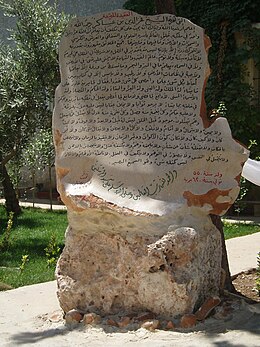Maqalat al-Islamiyyin
| Part of a series on |
| Ash'arism |
|---|
 |
| Background |
Maqalat al-Islamiyyin wa Ikhtilaf al-Musallin (
Most likely, al-Ash'ari wrote this book following the
Content
Al-Ash'ari first gives an objective account of the views of the Muslim sects; then he gives the views of non-Muslim sects and of the
It is in two parts, the first a short account of the historical origins of schism in Islam and a long patient listing of the major groups of his day, and the second a thematic tabulation of the various questions debated among Muslim intellectuals.[2]
Al-Ash'ari's Maqalat does not contain criticism to any notable degree. As its title indicates, all those who are included in the work are regarded as Muslims and 'those who pray', and so the work is a somewhat impartial survey rather than an appraisal of correct and incorrect doctrines. It serves as a handbook of theological views that might aid the reader in knowing what particular sects and individuals thought, and then what range of opinions was offered on the various questions debated within theology.[2]
Reception and influence
This work became a model for similar works produced afterward, such as
Notes
- Al-Ash'ari also composed a lost and little-known work, entitled Maqalat Ghayr al-Islamiyyin (The Teachings of Non-Muslims).[2]
See also
- Risalat Istihsan al-Khawd fi 'Ilm al-Kalam
- Tabyin Kadhib al-Muftari
- Mujarrad Maqalat al-Ash'ari
- Al-Asma' wa al-Sifat
- List of Sunni books
References
- ISBN 9783643800497.
- ^ ISBN 978-0700715886.
- ^ "كتاب مقالات الإسلاميين واختلاف المصلين للشيخ أبي الحسن الأشعري: جوانب من دقته، وتقريب لقيمته". arrabita.ma (in Arabic). Muhammadan League of Religious Scholars. Archived from the original on 13 Jan 2024.
- ISBN 9789004259683.
- ^ ISBN 9781472569455.
- ISBN 978-1453595848.
- ^ "شاهد.. كلمات من ذهب للإمام الأشعري". elbalad.news (in Arabic). Sada El-Balad. Archived from the original on 13 Jan 2024.
External links
- Maqālāt al-Islāmīyīn — Encyclopedia Britannica
- Maqalat al-Islamiyyin — Goodreads.com
- MAKĀLÂTÜ’l-İSLÂMİYYÎN — İslâm Ansiklopedisi (in Turkish)
